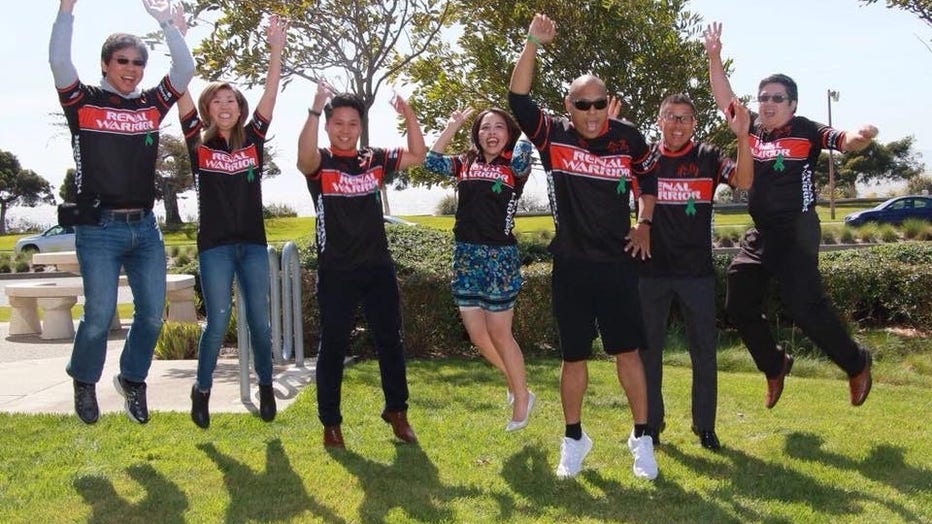Marathon weekend bring kidney donors, recipients and those on the transplant list

Marathon weekend bring kidney donors, recipients and those on the transplant list
If you are looking for inspiration, sit for a moment with Wilson Du and listen to his story. It was 2016 and he was just 34-years old, working hard, and playing harder when his kidneys failed.
SAN FRANCISCO - If you are looking for inspiration, sit for a moment with Wilson Du and listen to his story. It was 2016 and he was just 34-years old, working hard, and playing harder when his kidneys failed.
"I was in the hospital six or seven weeks. And what we're looking at is at the time, I needed to lose 100 pounds, otherwise I would not qualify for a kidney transplant," Du said. "And at the time, I've struggled to even lose 20 pounds my whole life, my whole adult life."
At 315 pounds he was a wheelchair user as he went back and forth to dialysis and then one day he said, "Something inside of me said choose life and fight. And from that day I picked myself up off that wheelchair. I remember that picking myself off the wheelchair. And I just took a few steps, maybe about 10 feet from the wheelchair to the front door and back. And those steps were the most painful steps I've ever taken in my life."
Two years after he took those first steps, he lost more than 100 pounds and made it onto the transplant list and he continued to fight saying, "walking turned into running, running, turned into biking, turned into running races 5ks, 10ks, half-marathons, and then into biking," Du said.

Courtesy: Wilson Du
Three years after getting on the list he got his kidney, but his story was just beginning. Working out wasn't just a necessity it became a lifestyle and he eventually took over a gym and then he created something remarkable.
"We had this class, what we call the warrior class," explained Du. "And it's for the chronically ill, for those that are vulnerable in our communities, those that have some type of conditions."
He trains people with chronic illness and people like Marco Alvara, a San Francisco police officer whose kidneys failed him back in 2021. He said the news left him devastated. He had always led a physically active healthy lifestyle, but now fights fatigue and the ongoing dialysis has made it impossible to work.
"I do what I need to do as far as treatment, maintaining my healthy diet, being physically active," Alvara said. "And, you know, keeping in touch with friends, families and doing my best to motivate others, you know, in my situation being that inspiration."
Alvara and Du will run the San Francisco Marathon 5k this weekend to inspire others and show people what can be done even when facing renal failure.
Alvara is still waiting for a donor, he is one of thousands of patients on the list at UCSF. "We at UCSF are one of the largest transplant centers in the country, and this past year we've done over 400 kidney transplants," says UCSF nephrologist Dr. Allison Webber. She says there are about 4 thousand people on transplant list and says there "is absolutely a growing need. You know, we have a real problem. The United States with diabetes, which is the number one cause at end stage kidney disease in our country, and more and more people on the wait list waiting for a kidney transplant."
UCSF, has partnered with the national kidney donation organization to raise awareness about the need for donors. Part of the solution they say is living donors. Most people have two kidneys . Most only need one.
Matt Cavanaugh is the president of the National Kidney Donation Organization and an Army veteran. "We don't need a miracle. We were born with two kidneys. We only need one kidney to live a full, physically fit, healthy life," Cavanuagh said. He is going to be running the San Francisco Marathon on Sunday. It was just one of 12 that he will complete this year as part of the 1K12M project saying "this is number seven. So my partner, Hillary Baude, and I are both living donors and we're running. We're committed to running 12 marathons this year again, to show people what you can do after you donate."
Stream KTVU on your TV by downloading Fox Local on your Roku, Amazon Fire, AndroidTV or AppleTV device for free. More details here.
They share their story as does Du because they say they know it matters. Du got his kidney after someone heard his story and his story also inspired gym staffer Amy McCann to sign up.
"I went to get tested," she explained. "I got the information, went to get tested, and I was declined because I was still overweight. I was in the process. I've lost about 100 pounds," McCann said.
She lost the weight, and on her birthday just two months ago she donated her kidney to a stranger.
"Something just in me was like, 'No, why can't you do it?'" said McCann, "You're healthy. You've got to. You don't need them both. Why not help somebody?"
These are the stories that will be told when the sea of people that will take to the streets of San Francisco for marathon weekend. They are stories of battles being fought, stories of strength and of community, stories that continue to inspire.
We're showing this adversity that we're not going to go down so easily that we will overcome this thing. That's what crossing that finish line means, that that's what that medal is going to mean.
For more information:
1K12M One Kidney 12 marathon project
National Kidney Donation Organization

